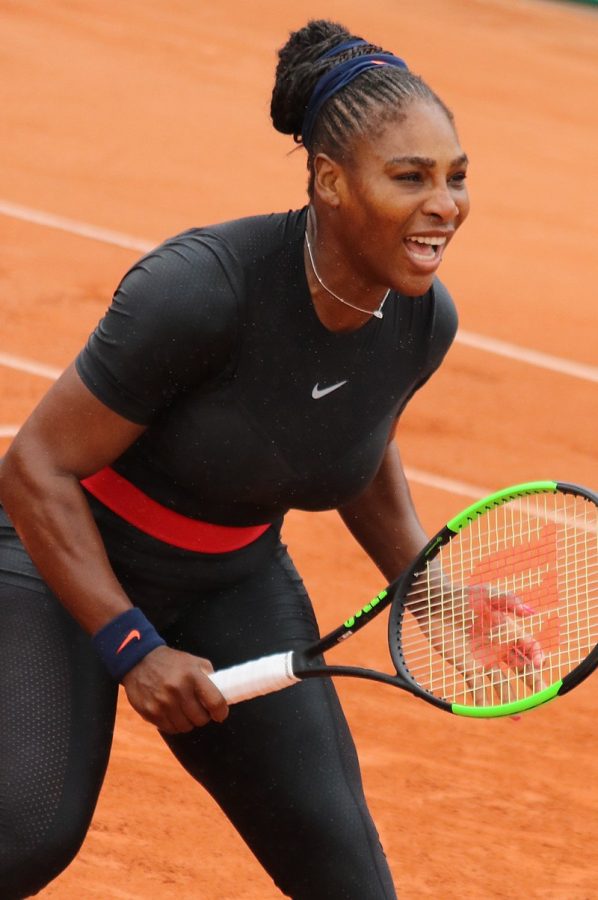Women are always expected or preferred to be devoid of emotion. When they express their anger or fight injustice they are shamed and looked down upon. This exact event took place on Sept. 8 after Serena Williams lost the U.S open to Naomi Osaka.
Serena and the referee, Carlos Ramos, had their first mishap when he accused her of being coached from the stands. Serena adamantly denied the accusation and told him that she doesn’t take off-court coaching and would rather lose than cheat. Later in the match, after smashing her racket on the ground and a count of verbal abuse, Serena was docked two points. This ultimately resulted in her loss. However, her “verbal abuse” that provoked her second docked point only involved her calling the judge a thief for docking her first point.
USTA President Katrina Adams told ESPN, “When you look at Carlos in this situation, it’s a judgment call to give that last penalty because she called him a thief. They’ve been called a lot more,” This instance illustrates the sexism shown in sports. Billy Jean King, a former World No. 1 professional tennis player, wrote on Twitter: “When a woman is emotional, she’s ‘hysterical’ and she’s penalized for it. When a man does the same, he’s ‘outspoken’ and there are no repercussions.”
PV girls tennis coach, Eric Crawford, followed the match and its aftermath, “Generally speaking you need to swear at refs before you get docked any misconduct points, and she didn’t do that or threaten anyone. There’s definitely a double standard there.” Crawford has witnessed this sexism first hand with his daughter, Shannon, who was the first girl to play on the baseball team in Iowa and with the girls on the PV tennis team.
“Shannon got hackled all the time. People would say this is a boy’s sport, what are you doing out there. Or you’re just on a guy’s team because you want to get laid. A lot of times girls are expected to play certain sports and roadblocks are put in front of them for other sports. Girls playing football have all sorts of roadblocks, as did Shannon with baseball.”
“Girls are supposed to be dainty and not physical, they get made fun of if they’re not physical. Being a volleyball coach, I had numerous girls that wouldn’t lift because they thought guys wouldn’t like them if they lifted. I think girls are afraid to go in and lift because their bodies change and they’re afraid they’ll get judged by other people. I still can’t get my tennis players to lift.”
The aftermath that followed the match demonstrated even more sexism and racism towards Serena. While some supported her and took her side in the injustices of the match, many did not. Headlines described the event as a “meltdown”, an adjective that never would have been used if this had happened to a man.
Senior Lilly Williams is an active member of the GLI club at Pleasant Valley, and also a member of the swimming and diving team. Williams has dealt with and experienced sexism both in and out of sports. “Sexism is a big component of the athletic atmosphere. I have friends that have faced sexism in sports, whether it is male players getting greater privileges or [my friends] being underestimated by coaches and players because of their sex. Women are consistently described as being over emotional and sensitive. Some of the strongest moments in history of female resistance has been written off as a ‘breakdown’. Serena expressing her anger shouldn’t be written off as a meltdown, a man’s similar reaction would be described as ‘fierce’ and ‘strong’.”
From the first argument with Ramos over her accused cheating to the aftermath of the match, it’s clear to see the sexism involved with sports. The double standard was demonstrated throughout the match, starting with Serena’s fine for smashing her racket and ending with the verbal abuse call that ended the game. Some of the top tennis players in the world, Rafael Nadal, Roger Federer, and Novak Djokovic—have all smashed their tennis racquets in fits of anger. Ferder aimed vulgar language at an umpire, yet none of these players got fined or received a penalty. It’s evident from this issue that the way women are treated in sports needs to be reassessed so that this generation and future generations don’t have to continue to get this unfair treatment.









